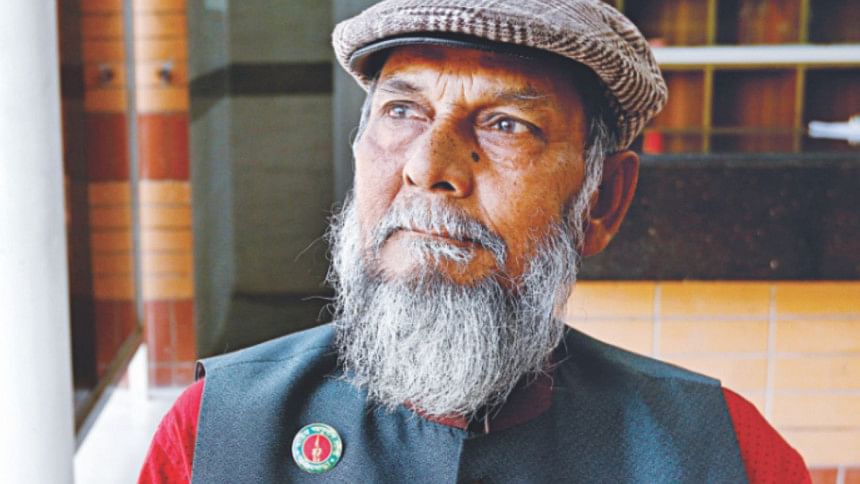WIRELESS MAN'S WAR


“Base for all stations from East Pakistan Police. I say again Base for all stations from East Pakistan Police. Very, very important message for you. Keep note. Keep listening, watch. We are already under attack by the Pak army. Try to save yourself. Over and out."
An eerie stillness hung over Dhaka since the afternoon of March 25, 1971. In the evening, the uneasiness escalated into a foreboding, like a lull before the storm.
With information from various sources pouring in, Md Shahjahan Mia, a wireless operator at the Rajarbagh Police Lines Control Room, thought something might go very wrong.
After dinner, he went out of his barrack for a walk on New Circular Road. It was around 8:15pm. There, he met a son of Gazi Golam Mostafa, the then president of Dhaka City Awami League, who alerted him to the looming danger.
"He informed me that the Pakistani army was mobilising troops at the cantonment and may launch attacks tonight on Rajarbagh Police Lines and other parts of the city. He requested me to spread this message in the police lines," Shahjahan said.
The horror that would unfold a couple of hours later was well beyond his imagination.
"I still shudder at the thought of the black night," said Shahjahan, now 73, as he shared the memories of the incident with The Daily Star on March 20 at the Rajarbagh Police Lines, the very place that was among the first hit on that fateful night. As many as 150 policemen were massacred there.
From Netrakona's Kendua, the father of six sons is now in Dhaka to attend the Independence Day's programmes to be held at the police lines.
After meeting the AL leader's son that night, Shahjahan, who was 25 then, walked straight to the barrack and informed 15 to 20 others what he heard. All of them put on uniforms and rushed to the administrative building.
Reaching there, the policemen found routine roll call going on. They then held a discussion and immediately reached a decision: a resistance would be put up with whatever arms and ammo they had.
Then came the question of collecting arms. To get them in hand, they would need to get into the armoury.
A group of the policemen rushed to the residence of Reserve Inspector Mofiz Uddin to get the keys. But the RI said he would not hand it over without permission from the higher authorities.
Then they took the keys forcibly and opened the armoury. There were mostly .303 rifles and those were distributed among the police personnel.
They all took position.
One group spread out across Shahidbagh, Malibagh and Moghbazar areas.
Another took position in Chamelibagh, Shantinagar and Bailey Road areas. This group later marched towards the then Intercontinental Hotel, Shajahan recalled.
Around 9:30pm, Shahjahan and his co-fighter Monir took two rifles and 20 bullets and ran towards the wireless base station in Rajarbagh. Shahjahan took charge there.
About 40 minutes later, they received a message from a police patrol team in Tejgaon Industrial Area.
The team's code was Charlie 7.
"Charlie 7 for base," the message said.
"The base for Charlie 7, you are loud and clear. Send your message. Over," Shahjahan replied.
"About 35 to 37 trucks loaded with Pak army are proceeding towards Dhaka city from the cantonment. Over," the message said.
"Charlie 7, Roger [received and understood] and out," he answered.
The message was clear. The Pakistani army had left the cantonment.
Except Shahjahan and Monir, all the others then left the Rajarbagh station with their arms.
Right at that moment, someone rang the Pagla Ghanti (alarm bell)
Everyone started to rush.
The main armoury had already been emptied. So the policemen broke the lock to the reserve armoury, armed themselves and started chanting slogans: Bir Bangalee ostro dhoro, Bangladesh swadhin koro [Valiant Bangalees, take up arms and free Bangladesh]."
The flag of the independent Bangladesh was flown.
The policemen took positions in the barracks, rooftops, beside the pond there and around the base.
A group of 10 to 12 were at the roof of Don High School (now Eastern Plus Market). A barricade was set up in front of the school.
In the meantime, Shahjahan and Monir were waiting for the next message.
Around 11:30pm, a Pakistan army vehicle, coming from Chamelibagh, stopped in front of the barricade. Some of them got down to clear the road.
"Right at the moment, the policemen started firing at the Pak army from the roof," Shahjahan recalled.
Two army members died, and a few others were injured.
"Then began a war. A fierce war,” he said.
While the Bangalee policemen were firing single shots, the Pakistanis were firing indiscriminately from LMGs (light machine guns), heavy machine guns, and mortars.
All of a sudden, a shell hit a workshop at Rajarbagh, breaking off a pillar.
The entire area turned dark as the electricity went off.
Shahjahan got puzzled for a while. Then he discovered that he had a big weapon: a wireless set, with which he could spread the message to all police stations and units in the districts and sub-divisions of erstwhile East Pakistan, now Bangladesh.
He thought he should alert the people that the Pak army began its attack and that the Bangalee policemen had already put up an armed resistance.
Without further delay, he wrote a message in English. It was around 11:55pm.
"I took the microphone of the wireless set and started delivering the message," he said.
"Base for all stations from East Pakistan Police. I say again Base for all stations from East Pakistan Police. Very, very important message for you. Keep note. Keep listening, watch. We are already under attack by the Pak army. Try to save yourself. Over and out."
Shahjahan could not stay anymore at the wireless station after sending the message.
He and his fellow operator, Monir, rushed to the roof of the four-storey administrative building, and joined around 50 policemen already holding defensive positions there.
Despite their heavy preparations, the Pakistani Army personnel could not enter the Rajarbagh Police Lines till 2:00am.
The army men then regrouped and continued the attack. They brought in a tank and destroyed two main gates of the police lines.
"We fought as long as we could but as we ran out of bullets, we had to fall back,” he said.
The Pakistan army then massacred many policemen inside the base. They torched four barracks of Provincial Reserve Forces by using gunpowder. The flames rose high.
"Around 150 policemen were killed," he said.
The army captured Rajarbagh around 4:00am.
"They pulled the dead bodies to trucks. We were watching it from the roof," he said, adding he along with other policemen climbed down the pipes and tried to hide.
Five of them, including Shahjahan, took shelter in a small space under the water tank, throwing their arms away. By 5:00am, they were captured by the army.
The army men got them out of the space by using bayonet. They were mercilessly beaten with hockey sticks and rifle butts.
Later, all detainees were kept together. There were around a hundred captives in total, Shahjahan recalled. Of them, 25-30 were cooking staffers.
The Pakistan army brutally tortured them.
"At one stage of torture, I passed out," Shahjahan said.
He regained consciousness in the afternoon of March 26. The Pak army released him in the afternoon of March 28.
After his release, Shahjahan went to his village home in Kendua of Netrakona, walking. It took him four days.
Around a week later, he along with two of his brothers left for India. Later, he returned and fought the Liberation War under Sector-11.
Shahjahan said he confronted with enemies in Dharmapasha, Kalmakanda, Durgapur and Haluaghat zones.
After the war ended, he surrendered his weapons at the then East Pakistan Rifles headquarters in Mymensingh.
He rejoined the police force as an assistant sub-inspector in 1972 and was later promoted to the post of sub-inspector.
Regrettably, the war veteran had been sent into forced retirement in 1985.
"That's another story. [I] will tell you that some other day," concluded the man, who now lives in his village in Netrakona.


 For all latest news, follow The Daily Star's Google News channel.
For all latest news, follow The Daily Star's Google News channel. 






Comments